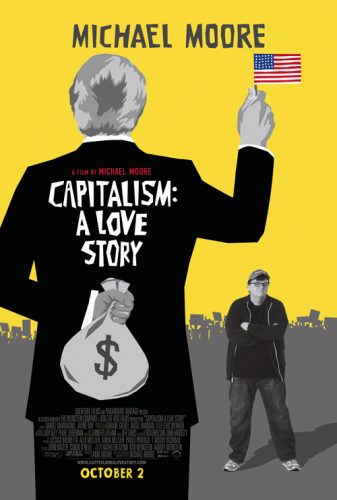
Michael Moore despite what people say of him is one of the most important documentary film-makers of the modern age, he is constantly inspiring, challenging, brave, controversial and ultimately intelligent in the way he conceives an argument and its subsequent investigation in film. His first international and arguably most powerful experiment was 2002 s Bowling for Columbine, which reflected on the issue of the casual arms trade within the U.S. Moore followed with 2004 s Fahrenheit 9/11 which obviously dealt with the aftermath and ramifications of such a emotional event, and more recently his 2007 Sicko had a stab at the U.S Health- care systems. None the less, whether it s the N.R.A, Bin Laden or Cuban September 11th rescue workers, Moore has always shown his world view with a addictive sense of humour and a critical eye for filtering out the bull-sh**.
Moore s latest plight is Capitalism: A Love Story, focusing on the global financial meltdown of the past two years. Moore attempts to use the film as a means of comprehension of what actually happened and what is happening, how did Western society allow the recession to manifest and how it has affected people s lives. As per usual the film is centered on the United States, but perhaps more than just bias, Moore claims it is the country fundamentally responsible, and shouts where is our money? To anyone and everyone in positions of trust both politically and financially. Moore now a celebrity himself, struggles with his notoriety as one to cause trouble and so many doors seem shut for answers. However, Moore is not one who easily gives up, and manages to present us with a solid dissection as to a look at a chronological lead up to the crisis, and to who is chiefly responsible.
What strikes a chord more than all of the wonderful cut and paste humour or hard cold facts is the story of how ordinary people have been affected by such events, in that Moore proves to have not just been an anchor man with an eye for a story, but a filmmaker of the people and for the people. The ultimate irony in which, is that Moore himself will profit from this film, but if we can forget this for a moment, he manages to exercise an incredible humility throughout, and tells the tale of a real human story of utter despair. This film proves as a result to be a real tear-jerker of the truest nature, in that what you are experiencing is real; Moore s revelations and evidence will literally shock and slap you to your foundations, and in no short measure, he never takes the cheesy route or even particularly subjective eye, his film proves to be adamantly objective.
This film speaks to everyone, it couldn t be more relevant, whether you re Barack Obama, a banker or a dustbin man, everyone has been and will be affected by the issues investigated in Moore s film. The excess and mistakes of Capitalism has pushed western society to its brink, even the bail-out is not without corruption, Moore embodies such conviction in his findings that you cannot help but be compelled and engaged with what he is saying. It is unfortunate that Moore did not have more rights to investigate, as many doors are closed to him, which does create an identity crisis for the film in parts, however there is enough meat on the bone to force you to see what people are capable of. It would be a mistake to disregard this film as depressing or sensationalist, as I do not believe it is contrived propaganda, what would be the point? There is too much humanity invested into this film for it to be irrelevant.
Capitalism: A Love Story may not change your life, but it will force to you to re-assess it, it is hilarious in parts, incredibly sad and horrible in others, but fundamentally inspiring and educational in its conviction and presentation, its bite is powerful and does leave a sour taste but the humanity and ideas of change leave hope, this should be mandatory viewing for every-one into revealing the nature of the beast and for the future of our so-called society.











